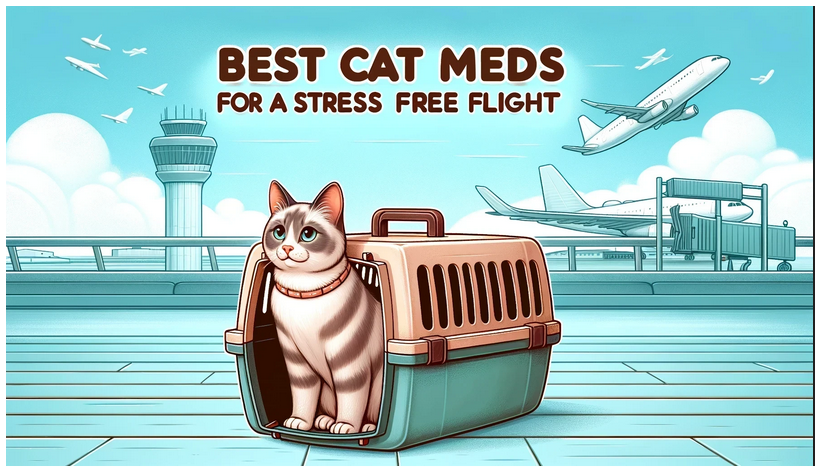Traveling with your cat can be a stressful experience for both you and your feline friend, especially when it involves air travel. To ensure a smooth journey, it might be necessary to consider medication for your cat. Here’s a comprehensive guide on the types of medication available, how to use them safely, and tips for making air travel as comfortable as possible for your cat.
Types of Medication
Sedative and Anti-Anxiety Cat Meds:
- Acepromazine: A long-lasting sedative for cats that is also has anti nausea properties, making Acepromazine especially useful for long air trips. It helps reduce anxiety and has a calming effect. But be on the lookout for dry eye and hypothermia, as these are known side effects. Acepromazine is available and scored tablets or as an injectable. Your vet can advise you on the most appropriate dosage and method of administration.
- Gabapentin: Commonly prescribed for pain and anxiety, Gabapentin has a calming rather than sedating effect. Mild lethargy is the most common side effect. It is effective in reducing anxiety during travel. However, while the stress reducing dosage of 20 mg/kg is fine for young, healthy cats, this dosage can affect the cat’s kidneys, making it inappropriate for older cats or cats with chronic kidney disease.
- Alprazolam (Xanax): Sometimes used for cats with severe anxiety, especially if it involves panic. There are several contraindications for this drug, so it’s crucial to consult a veterinarian familiar with all of your cat’s regular medications and existing medical conditions. Be sure to use the exact dosage as prescribed by your vet. And you should to test your cats’ reaction to this drug prior to travel, as some cats can have an opposite reaction, becoming agitated and aggressive.
Anti-Nausea Cat Meds:
- Maropitant (Cerenia): Used to prevent vomiting and nausea during travel. It was approved for use in cats by the FDA in 2012 and also has mild pain relieving and anti-inflammatory affects.
- Metoclopramide: Most commonly used to treat acid reflux. Metoclopramide is also used to treat vomiting.
Herbal and Natural Remedies:
- Feliway: A synthetic feline pheromone that can help reduce stress and anxiety. For more information on cat pheromones, check out Can a Plug-In Improve Your Cat’s Behavior?
- Bach Rescue Remedy: A homeopathic, non-habit forming and alcohol-free solution that’s easy to use and helps calm cats in stressful situations. Its made from a combination of five flower remedies, including Star of Bethlehem, Rock Rose, Cherry Plum, Impatiens and Clematis.
How to Use Medication Safely
- Consult Your Veterinarian: Always, always, always, before administering any medication, consult your veterinarian to determine the best option and correct dosage for your cat’s specific needs.
- Trial Run: Test the medication at home before the trip to ensure your cat doesn’t have any adverse reactions.
- Follow Instructions: Always follow the vet’s instructions on how and when to administer the medication.
Tips for Air Travel with Cats
Preparation:
- Familiarize Your Cat with the Carrier: Leave the carrier out for a few weeks before the trip to allow your cat to get used to it.
- Vet Check-Up: Ensure your cat is healthy and up-to-date on vaccinations.
- Identification: Make sure your cat has a microchip and a collar with an ID tag.
During the Flight:
- Comfortable Carrier: Use a comfortable, well-ventilated carrier that meets airline requirements.
- Comfort Items: Include a blanket or toy that smells like home to comfort your cat.
- Stay Calm: Your cat can sense your anxiety, so stay calm and composed.
Post-Flight:
- Hydration and Feeding: Offer water and a light meal once you’ve reached your destination.
- Monitor Your Cat: Keep an eye on your cat for any signs of distress or illness.
Conclusion
Medication can be a useful tool in ensuring a stress-free travel experience for your cat. Always prioritize your cat’s health and well-being by consulting with a veterinarian and using medications responsibly. With proper preparation and care, you and your feline companion can have a safe and pleasant journey.
For more information on traveling with cats, check out these resources:
- VCA Animal Hospitals- Flying With Your Cat
- Condé Nast Traveler- How To Travel With A Cat
Feel free to visit my blog, Home with Cats, for more tips and advice on cat care and travel.





I haven’t checked in here for some time as I thought it was getting boring, but the last few posts are great quality so I guess I’ll add you back to my daily bloglist. You deserve it my friend 🙂
I stumbled upon this and it has helped me out loads. Great job.